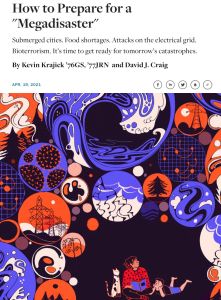Join getAbstract to access the summary!

Join getAbstract to access the summary!
Kevin Krajick and David J. Craig
How to Prepare for a “Megadisaster”
Submerged cities. Food shortages. Attacks on the electrical grid. Bioterrorism. It’s time to get ready for tomorrow’s catastrophes.
Columbia UP, 2021
What's inside?
Natural and human megadisasters can change societies, so be prepared.
Recommendation
Either the natural world or prolonged human activity can cause megadisasters, the kinds of calamities that have emerged throughout history, from Pompeii to the plague that devastated Europe’s population in the Middle Ages. Megadisasters affect entire societies and change history. Globalization and climate change mean that human activities help generate more megadisasters, from extreme weather to pandemics. In Kevin Krajick and David J. Craig’s Columbia magazine interview, Jeffrey Schlegelmilch, author of Rethinking Readiness, explains why people must learn how to prevent megadisasters and how to prepare for them.
Summary
About the Authors
Kevin Krajick is the Earth Institute’s senior editor for science news. David J. Craig edits the Explorations and Bulletin sections of Columbia magazine and writes about social science and the natural sciences.
















Comment on this summary